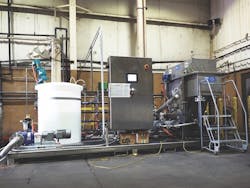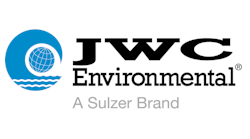Cost: $250,000 to $300,000
Location: Portland, Tenn.
Year: 2018-12-01
Size: 17 gpm
Owner: Unipres
Designers: FRC & Hanka Associated LLC
Contractor: ARMI Contractors
In 2017, Unipres USA was in dire need of an upgrade to its plant’s wastewater treatment system to achieve compliance with discharge limits of the local wastewater utility. The system for the Unipres site needed to process 17 gal per minute (gpm) of wastewater and bring the fats, oil and grease down from 5,100 mg/L to less than 100 mg/L. It also needed a design approach that would minimize disruption to plant operations as well as work within the project budgets.
Unipres focuses primarily on the stamping, machining and assembly of metal parts for the main portions of automotive body structures. In addition to pressing molded components and precision automatic transmission parts. The company has been in Portland, Tenn., since 1987 and employs a workforce of more than 1,000.
In 2016, Portland cut off the Unipres plant’s ability to discharge plant wastewater into the city’s municipal wastewater system. The plant was relying on a rudimentary oil-water separator to remove the oils present in the waste-stream before discharge to the city’s municipal treatment system. The system was frequently overwhelmed by the high oils concentration, particularly when wastewater volume increased dramatically due to the collection of rainwater in natural catchments formed by the geology underneath the plant site. Oils also were a challenge for municipal systems, due to their tendency to polymerize and agglomerate within the municipal infrastructure, which can constrict the capacity of the system as a whole and require expensive manual cleaning of the municipal pipes.
“The primary goal was to satisfy the client’s need for a cost-effective solution and provide a robust, reliable system to keep them in compliance,” said Kevin Bates, global marketing director for JWC Environmental. “This was not the only concern though. The brisk pace of the manufacturing operations and minimal tolerance for disruptions at this facility prompted a focus on ease of delivery, installation and start-up.”
Unipres was required to haul their plant’s process discharge water to a specialized treatment facility that could handle the elevated oil concentrations, as a result of being shut off from the local municipal system. As a result, it undertook a project to upgrade the plant’s treatment systems to meet local discharge requirements.
The team looked at several technical approaches to solve the problem and settled on an FRC dissolved air flotation (DAF) system from JWC Environmental. Other treatment technologies were considered from other engineering providers, including ultrafiltration (UF) and evaporation. They were both rejected due to higher cost, among other reasons. For the UF, the presence of silicone in WD-40 and other lubricant products, would destroy most UF membranes. The evaporation option was even more costly and involved possible air permitting issues.
“The biggest challenge was to provide the treatment system installation and startup during a three-day window,” Bates said. “This was achieved through the design of a fully skid-mounted system that was preassembled when it arrived at the Unipres facility. The [designer] coordinated closely with the client and contractor for a smooth turnkey installation.”
Unipres worked with Hanka Associates and the JWC Environmental FRC Industrial Wastewater team to finalize the design requirement for the Portland plant. At the forefront were goals of limited disruption to operations and maintaining budget constraints while meeting the discharge requirements.
The pace of the plant’s operation and minimal tolerance for disruptions prompted a focus on ease of delivery, installation and start-up. A skid-mounted design for the entire system with a layout that allowed its placement as close as possible to the existing wastewater infrastructure ensured the fastest possible installation by the ARMI Contractors group. The design allowed for repurposing of the of the oil-water separator as an equalization tank, which also helped maintain the project budget.
“Unipres was very happy with the working system,” Bates said. “And, when Unipres invited the local municipal wastewater officials for a tour, the utility asked to use the installation as a case study for other industries that discharge to their local municipal sewer system.
Click here to read more about the 2018 iWWD Top Projects.
Project Year: 2018-12-01
Contractor: ARMI Contractors
Designers: FRC & Hanka Associated LLC
Owner: Unipres
Location: Portland, Tenn.
Cost: $250,000 to $300,000
Size: 17 gpm



